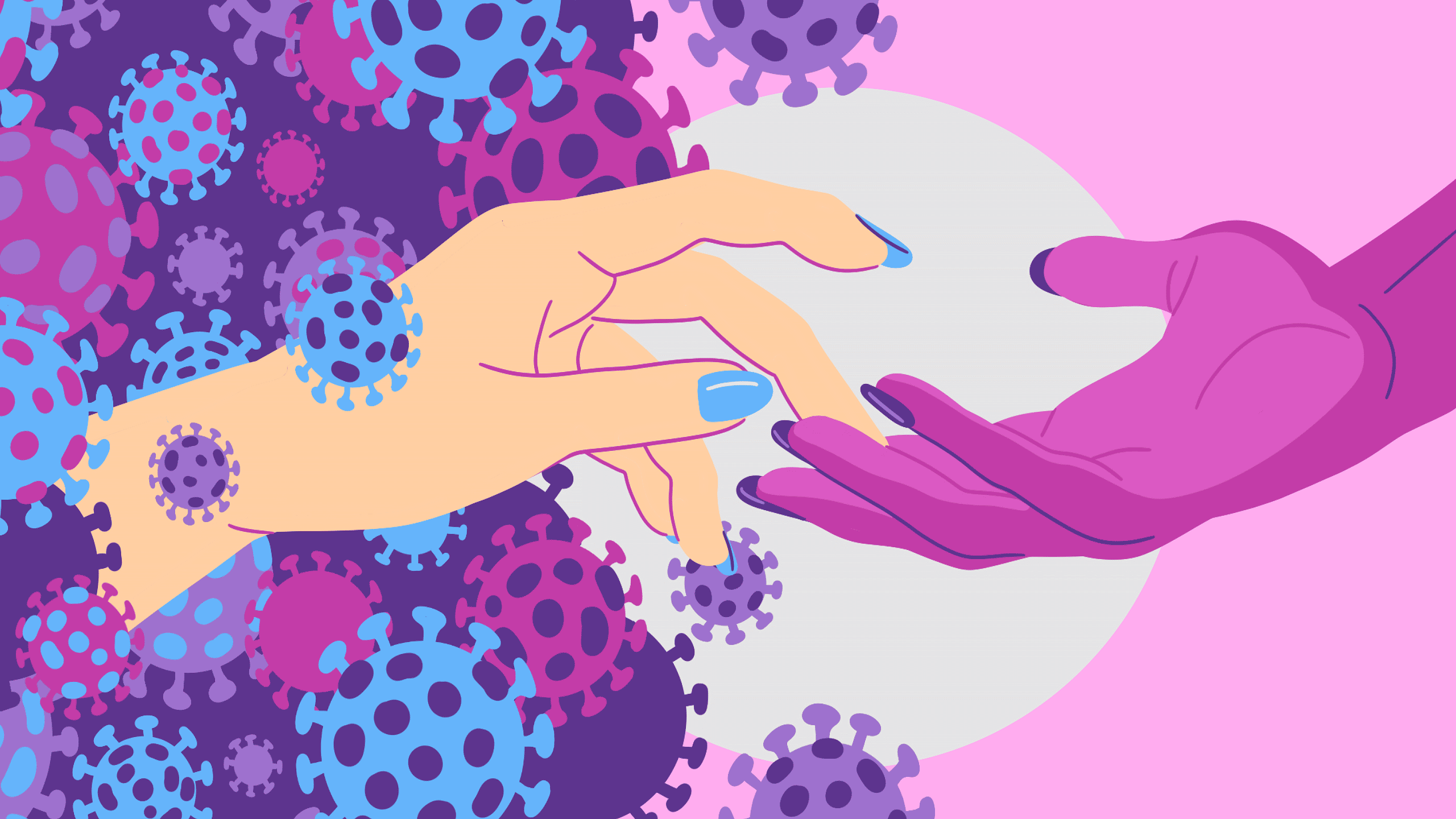“Are you sure that’s what it is?” I asked the doctor, my cotton mask absorbing runaway tears.
“It could be something else, like contact dermatitis,” he offered, “but we won’t know until the swab comes back.”
The polite smile told me his words were meaningless. He was just being nice. But after two days of crying on the toilet, because peeing felt like excreting tiny glass shards, I was desperate for reassurance. I let this false hope hover in the air before asking, “But it … looks like herpes?”
He nodded. “Yeah, most likely.”
The subsequent assurances—the virus is common, outbreaks are manageable and transmission rates are low—were lost on me. I just knew it wasn’t curable. As tears welled up again, I remembered sitting in a middle school auditorium in Alabama. A sex education instructor shared a harrowing anecdote about a woman who got herpes from a one-night stand. “Who would want her now?” she narrated like the ending of a ghost story.
As I stood up from the gynecologist’s chair, the diagnosis stinging more than the physical pain, I feared I’d become the girl they’d warned us about—a sexual pariah.
Thanks to sitz baths, a Valtrex prescription and the comfort of my roommates, I got through my first outbreak. My boyfriend Nick and I watched a Muppets movie while I kept a heating pad between my legs. I didn’t blame him. After all, he wasn’t aware of his status (up to 80 percent of herpes-positive folks are asymptomatic), and we had used protection at my urging. It was a case of bad luck.
However, as 2020 came to an end, so did my relationship. But the sage advice of “get over someone by getting under someone else” seemed impossible. Who would want to sleep with me, much less date me, knowing I could transmit a permanent infection? I was terrified. That future partners would see me as careless, dirty and undesirable. That friends would shame or pity me. After all, I can’t even audition for The Bachelorette anymore, if all else fails, due to their intensive STI screening requirements. From real life to reality TV, it’s clear how people typically view STIs. So I was terrified to come out as herpes positive. To anybody.
“With each disclosure, I grew accustomed to waiting for the right moment. To my heart pounding in fear right before the words fell out.”
Despite my insecurities, I wanted to prove myself wrong. I wanted a coherent, victorious narrative for my herpes story. To be able to say, “Yeah I have an STI, but now I’m having the best sex of my life! Fuck the stigma!” So, desperately chasing this happy ending, eager to put a neat bow on my diagnosis, I practised disclosing—to everybody. I started off small, by telling my roommate’s cat. For Snickers, no matter whether I had herpes or not, he’d still cuddle with me on the sofa and try to steal food off my plate. A guaranteed successful disclosure. Slowly, I moved to higher-stakes audiences by telling strangers in herpes support groups. Then friends. Then dates. With each disclosure, I grew accustomed to waiting for the right moment. To my heart pounding in fear right before the words fell out. To wondering if I should have said nothing at all. To wanting an answer to my implicit, always unspoken question: “Does this change how you see me?”
I initially hoped that my hyper-disclosing remedy would permanently numb me to this fear. I’d get the soft, affirming connection that disclosure provides, while receiving an immunity shot for the risks. But I soon realized that was impossible. I never got over the fear. I just got used to it. And the rewards—new friends from support groups, better communication with partners, and helping friends unlearn their own sexual shame—were worth the paucity of negative responses.
Around this time, I made a new friend. Maddie carried an air of confidence in every room she entered, a tote bag featuring a Joan Didion quote always draped over her shoulder. She worked at a well-known museum. When we first met, she said, “I like your earrings,” and my heart stopped. I wanted to sit close to her at dinner parties. I noticed the subtle differences in the waves of her blonde hair. Not—I slowly realized—because I envied her hair. But because I wanted to run my hands through it. Cue bi panic.
If I had met Maddie a year earlier, I would have repeated my usual mantra: “Every straight girl thinks about girls sometimes.” The following is a non-exhaustive list of the times I’ve repeated this credo with insistence:
- In middle school when I devotedly played Carmen Sandiego computer games—fuelled by my obsession with Carmen. Particularly, her sultry voice, her cocked hip in a standing pose and the way she wore the hell out of a red trench coat.
- In high school, I bonded with Sarah from photography class over John Green books and being in therapy. I loved her purple hair and the fact that she’d been to five Evanescence concerts. “I’m never coming back to this shit town,” she said about leaving the South for college. When I frequently fantasized about visiting her at school, we’d go to parties, she’d show me her dorm room, and we’d make out on her bed like Brittany and Santana from Glee.
- In college, I craved my friend Kate’s admiration. She called me her “mentor” in our ancient history classes, but I was the one who envied her intellect. At one off-campus house party, I caught myself staring at her breasts. I continued diverting my eyes for weeks. On one drunken night, I kissed her in a Lyft to a party, and I grew warm with embarrassment when she teased me about it the next day.
- After college, I made out with my friend Amanda on Halloween. I intermittently asked for reassurance: “This isn’t weird, is it?” She replied no. Within moments, we were lying on the bed of the party’s host, me running my hand along her velvet shirt.
- Last month, I had a sex dream involving Blake Lively.
I knew the “every straight girl does this” rationale well. It was even easier to write off any moments involving alcohol, as it fits neatly into the “spicy straight” narrative à la Katy Perry’s “I Kissed a Girl.” But sober moments in daily life—hearing myself flirting with the woman at the Trader Joe’s counter, nervousness around the new woman at work, staring at Kiera Knightley in the Pirates of the Caribbean movies—were dismissed like rainbow glitter swept under a beige-coloured rug. But this time was different. After I started crushing on Maddie, I didn’t turn away. I attribute much of this strength to getting herpes, which had prepared me for two essential parts of being a “baby gay.”
First, coming out to yourself. For about a decade, I had buried any inkling of bisexuality, whether because of my religious upbringing, confusion about not being “queer enough” or fearing others’ reactions. But getting herpes taught me how to accept a scary, unwelcome facet of myself. As it turns out, unlearning homophobia was similar to unlearning STI stigma: recognizing that self-disgust wasn’t born, but rather learned. Then there’s coming out to others. With an STI, non-disclosure isn’t an ethical option, so I had forced myself to practise disclosing. Then when I came out to others as bisexual, I was already used to the adrenaline of just saying it. To ruminating on others’ reactions. To begrudgingly educating others and answering stupid questions. Essentially, herpes disclosures were basic training for coming out as queer.
My crush on Maddie never became a relationship. But simply recognizing the crush felt like answering the door after someone had been knocking for 27 years.
“I had two choices. One—I could reveal nothing of myself.”
Last week, I shared dumplings with a new date, Samantha. As we connected about travel stories and tattoo artist recommendations, somehow the topic of prior relationships crept in. I noticed she was avoiding any pronouns when describing her past partner. I did the same, saying “this person” and “my past partner,” essentially saying, “the individual of the human species whom I dated” with my hand hovering above the door handle of vulnerability. Then a “he” slipped out of her mouth. In response to the accidental hint at her sexuality, I had two choices. One—I could reveal nothing of myself. A passive decision that, a year ago, I would have certainly made. Or two—I could meet her there. I chose the latter, to sit with fear rather than oppose it. “I’m bisexual,” I said. I can’t remember whether I weaved the words seamlessly into conversation or if I blurted them out. But I did laugh about how I wouldn’t “ever date a male comedian again.”
She smiled. “I’m bisexual too,” she offered as though she owed me clarity, “but I haven’t had a significant relationship with a woman.” “Me neither,” I said, and I could finally breathe.
We talked about our bi-panic experiences and our celebrity crushes. We talked about the bad sex education in Alabama, and I offhandedly mentioned my herpes status. She smiled and said, “It’s so stigmatized for no reason.” After we paid, I walked her to her bike, heart pounding. With the lack of prescribed gender roles, how do you know if someone wants to kiss you back? I asked her, despite my shaking hands. “I was thinking the same thing,” she said before pulling me into a kiss that was soft like frozen yogurt.
Taylor Swift’s “Fearless” played in my head— a song about first kisses. I listened at 14, after accepting a sideways lip lock from my ninth-grade crush, Daniel. But it hit different now. I didn’t feel fearless. I felt full of fear, just like I do every time I disclose my STI status. Just like when I come out to people. But again and again, I do it anyway.


 Why you can trust Xtra
Why you can trust Xtra


